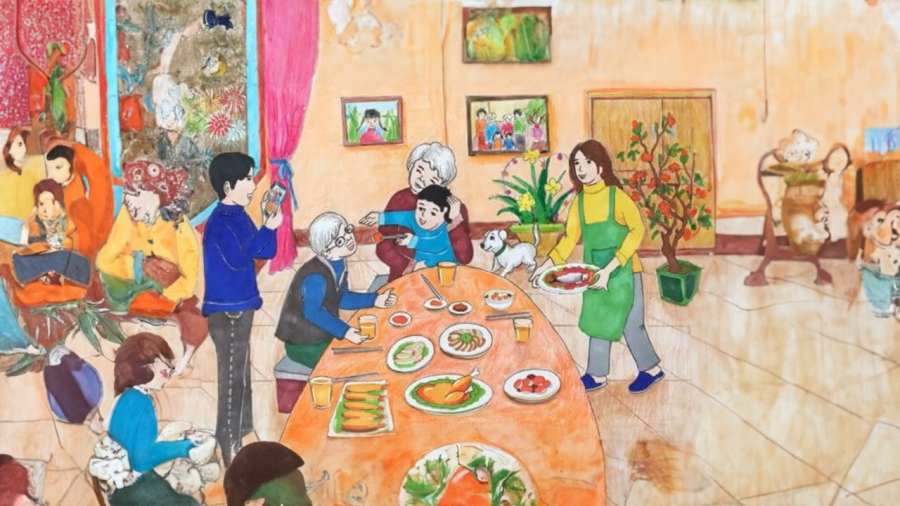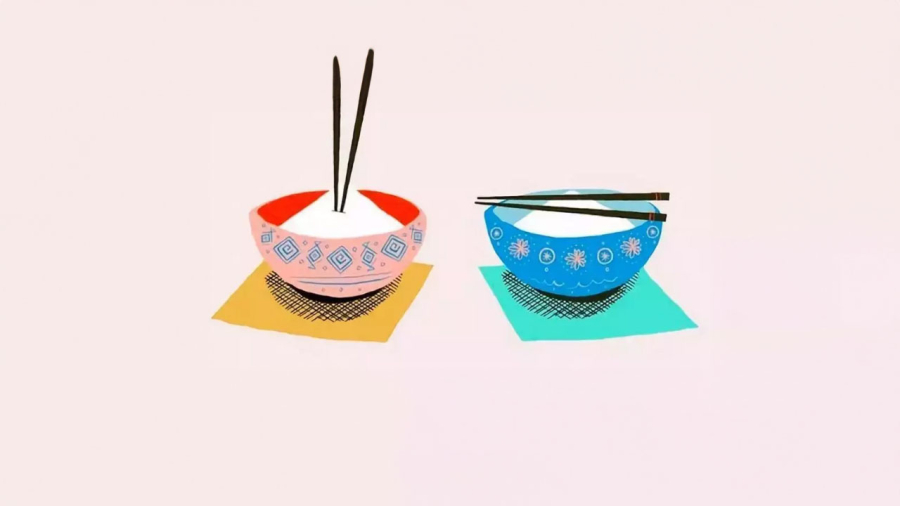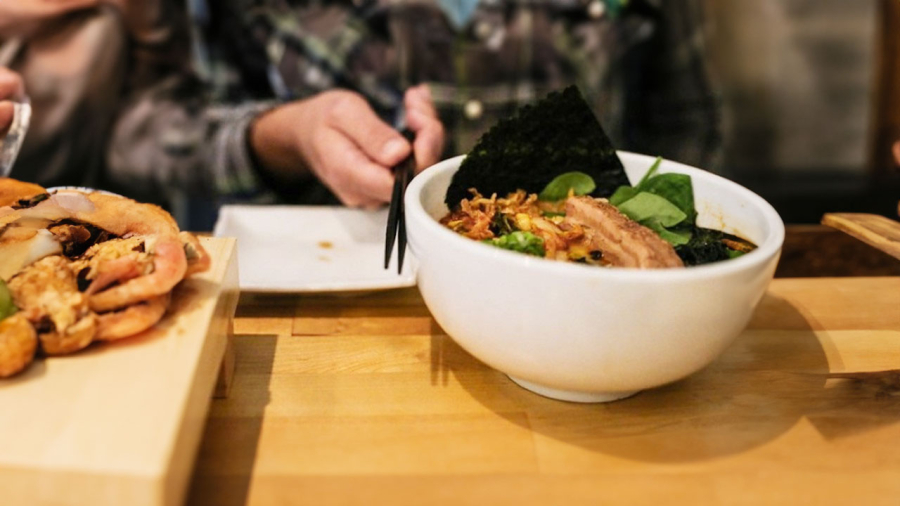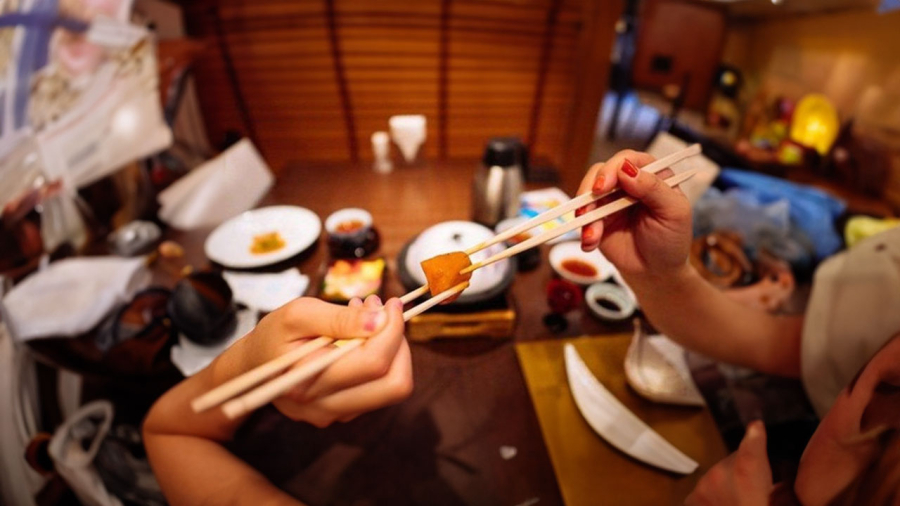A family meal is a time for the family to gather and bond. The way a family eats reflects their culture. It also shows the level of nutrition. The meal also reflects the fortune of the family, whether it is rising or falling. Therefore, our ancestors taught us very carefully about the etiquette of eating, the table manners to avoid bringing bad luck to the family and to create a harmonious and warm atmosphere.

The rice should not be stirred just once
In the past, the person sitting at the head of the table, usually the eldest or the adult, would stir the rice and put it into the bowls. The way of stirring the rice into the bowls is very important. It should not be too full like the offering rice, nor too empty, which shows indifference. Especially, the bowl should not be given to someone only after stirring it once. That is because stirring once represents offering rice to the deceased. Therefore, when stirring rice for each other, it should be done twice, avoiding putting a spoonful on top of a full bowl. Stirring the rice only once in the bowl is a bad omen. Moreover, when stirring the offering rice, it should be stirred full, meaning a full spoonful. However, when eating rice, it should not be stirred full, just enough to level or slightly below the rim of the bowl.
No criticism or teaching of children during the meal
If it is possible to talk during the meal, it should be done in a cheerful manner. Many people take advantage of the mealtime to criticize or teach their children. This not only makes the family atmosphere heavy, but also makes the meal less enjoyable and affects harmony. Moreover, the meal is very important in feng shui for a family, and a bad meal reflects a deteriorating family. Therefore, our ancestors taught us to avoid scolding or teaching children until after the meal.
No messy chopsticks on the table
When setting the table, our grandparents taught us to arrange the chopsticks neatly, with the tips clearly facing up or down, and not to leave them messy on the table. Messy chopsticks reflect a lack of discipline and education in the family. It shows disorder and a lack of respect for each other, leading to family conflicts. The act of holding chopsticks crookedly also indicates negative energy, affecting the family’s wealth and health, and causing disagreements. Therefore, when clearing the table, remember to place the chopsticks neatly on the table.

Do not stick chopsticks in the rice bowl
In folklore, sticking chopsticks in the rice bowl is a ritual for ancestor worship. Therefore, it is extremely unlucky to sit at the dining table and stick chopsticks in the bowl. Doing so brings bad luck and may even bring funeral arrangements for the family.
Be careful not to spill or drop chopsticks on the floor
During a meal, you need to focus and take care of your own bowl and chopsticks. According to tradition, breaking dishes during a meal is a very bad omen, indicating a fractured family, dissolution, and financial loss. Dropping chopsticks on the floor is like disturbing the rest of the ancestors, like a disturbance of the grave.

Do not tap the bowl or chopsticks on it
The act of tapping the bowl creates noise, which not only affects others but also brings bad omen. Our ancestors believed that only beggars would tap chopsticks on the bowl to attract attention from passers-by. Therefore, if someone taps chopsticks on the bowl during a meal, it will bring bad luck to the family, affecting business and leading to poverty. Therefore, our grandparents taught us to refrain from doing this. Tapping the bowl is usually only seen in restaurants when customers want to call the waiter. Therefore, if you eat at home or as a guest, this action shows a lack of respect and may cause conflicts or hurt feelings.
Avoid placing the bowl on the table and bowing down to eat
When eating rice, we need to bring the bowl close to our mouth, holding the bowl with one hand, chopsticks and spoon with the other hand. If we place the bowl on the table and bow our mouth down to eat, it is considered unlucky. Our ancestors taught us to bring food to our mouth instead of using our mouth to find food. Eating without holding the bowl indicates that fortune is declining, the family is in difficulty, and fortune is gradually declining. This method makes fortune dissipate and brings family conflicts. Moreover, bowing down to eat with the bowl on the table is impolite and the hunchbacked posture looks miserable and ungraceful. Usually, only dogs or livestock eat in a hunched position.

Avoid passing chopsticks from one to another
Passing chopsticks means that one person uses chopsticks to pick up food for another person to receive with their own chopsticks. This way of using chopsticks is often seen in rituals during funerals. Therefore, this action on the dining table suggests bad luck and does not predict anything good for the family but rather brings bad fortune.
Avoid flipping fish when eating
Flipping fish is reminiscent of flipping a boat, which brings many misfortunes. Therefore, you need to remove all the flesh on the top of the fish and then use your hand to hold one end and the other end with your chopsticks to flip it out. According to our ancestors, flipping fish when eating rice indicates a lack of order and respect in the family, reflects a capsized boat, and brings bad luck, family conflicts, and business failure. Therefore, it is important to refrain from flipping fish when eating.
A family meal reflects wealth and happiness. Therefore, during a meal, it is necessary to avoid unlucky things and things that bring bad luck in order to ensure a delicious meal and a healthy and joyful family.
Information is for reference and contemplation purposes only.
































